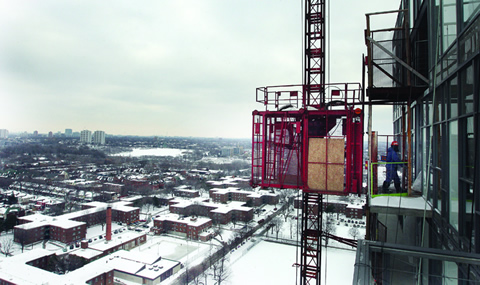In a city that venerated Jane Jacobs for her spirited defence of urban social diversity, Martine August’s sharp critique of Toronto’s mixed-income housing strategy is both provocative and timely.
August, a 2009 Trudeau Scholar in her third year of a PhD in planning, challenges the city’s current efforts to redevelop low-income housing projects into a mix of market and subsidized units. She argues that the strategy may not improve the lot of residents of neighbourhoods such as Regent Park, as the city has long promised.
» Redevelopment project web site (Toronto Community Housing)
For the past several years, Toronto Community Housing has sought to revitalize aging complexes such as Regent Park and Don Mount Court. Its strategy: move the tenants to temporary accommodations, raze the existing buildings and replace them with a mix of townhouses and condominiums. Profits from land sales to condo developers underwrite the construction of the new subsidized housing units. Policy-makers argue that such mixed-income neighbourhoods are safer, and offer residents more social and economic opportunities.
A long line of urban reformers has embraced the “social mix” notion, and few question the concept. August, though, wonders whether the poor see their lives improve because they live in mixed-income areas. Her research into U.S. public housing policy indicates that decision-makers should challenge the accepted wisdom.
“The empirical record suggests that low-income tenants do not tend to benefit relative to other actors in the process,” says August. She argues that gentrification and pressure from property developers are what really drive public housing redevelopment. In her view, public housing officials should aim to restore decaying apartments for existing tenants.
August surveyed American studies of public housing redevelopment schemes, both successful and not, looking for data demonstrating short- and medium-term outcomes such as improved economic circumstances, better housing, fewer instances of delinquency and improved educational achievements. In many American projects, only a handful of tenants ever return from their temporary accommodations, so they aren’t enjoying any of the benefits of the “improved” neighbourhood, she says. “I think public policy officials should be really worried about that.”
While August acknowledges that U.S. and Canadian cities respond to poverty differently, she says the American experience is “being imported with few critical questions asked.” Until now, that is. In her research, August is examining the effectiveness of Canadian projects.
The Trudeau Foundation, established in 2001 by the former prime minister’s friends and colleagues, announced 15 winners of its annual scholarships in May. Recipients receive a bursary worth up to $180,000 over three years to conduct research.







No Responses to “ The Future of Regent Park ”
[...] http://www.vitruvius.com.br/revistas/read/minhacidade/12.133/4004 http://www.magazine.utoronto.ca/leading-edge/toronto-regent-park-redevelopment-martine-august/ http://citynoise.org/article/5887 Share this:FacebookTwitterLinkedInGoogleEmailCurtir isso:Curtir [...]